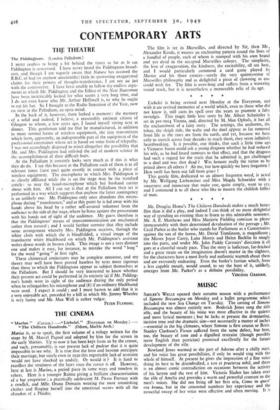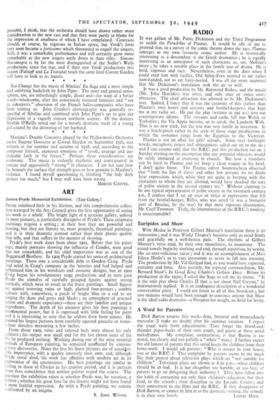MUSIC
SADLER'S WELLS opened their autumn season with a performance of Simone Boccanegra on Monday and a ballet programme which included the new Sea Change on Tuesday. The casting of Simone Boccanegra was almost entirely new. Roderick Jones sang the title role, and the beauty of his voice was most effective in the quieter and more lyrical moments ; but he lacks at present the dominating, incisive tone and the dramatic size—not necessarily a matter of inches . —essential in the big climaxes, where Simone is first cousin to Boris. Stanley Clarkson's Fiesco suffered from the same defect, but here, too, the beauty of tone and a dignified restraint (though possibly more English than patrician) promised excellently for the future development of the Rowland Jones warmed to the part of Adorno after a chilly start, and his voice has great possibilities, if only he would sing with the whole of himself. At present he gives the impression of a fine voice doing its best to be disembodied, a vox et praeterea nihil, and there is an almost comic contradiction on occasions between the activity of his larynx and the rest of him. Victoria Sladen has taken over the role of Amelia and provides a warm and powerful contrast to the men's voices. She did not bring off her first aria, Come in quest' ora bruna, but in the concerted numbers her experience and the i powerful sweep of her voice were effective and often moving. It is
possible, I think, that the orchestra should have shown rather more consideration to the new cast and that they were partly to blame for the impression of smallness of which I have complained. Contrasts should, of course, be vigorous in Italian opera, but Verdi's forte very soon became a fortissimo which threatened to engulf the singers. Still, it was a remarkable performance and will certainly grow more remarkable as the new singers settle down to their roles. Simone Boccanegra is by far the most distinguished of the Sadler's Wells productions since the war, -and if their new Verdi productions this season (Falstaff and La Traviata) reach the same level Covent Garden will have to look to its laurels. • * * * Sea Change has the music of Sibelius' En Saga and a most simple and satisfying backcloth by John Piper. The story and general atmo- sphere, too, are refreshingly simple, direct and—for want of a better word—wholesome, after the consciously tortured fantasies and " sex in sidestreets " obsession of the French ballet-companies who have been visiting us. John Cranko's choreography was generally re- spectful of Sibelius and combined with John Piper's set to give the impression of a vaguely sinister northern seaport. Of the dancers Sheilah O'Reilly stood out for a tensely dramatic study of a young girl crazed by the drowning of her husband. • * * *
Martinu's Double Concerto, played by the Philharmonia Orchestra under Eugene Goossens at Covent Garden on September 25th, was written in the summer and autumn of 1938, and, according to the composer himself, expresses emotions of " revolt, courage and un- shakable faith in the future." Perhaps these considerations are irrelevant. The music is violently rhythmic and contrapuntal in texture and aggressively " strong " in character. I am not sure how far beneath the surface that strength goes or how genuine is Martinu's violence. I found myself questioning it, thinking " the lady doth protest too much," but I may well have been wrong.
MARTIN COOPER.















































 Previous page
Previous page